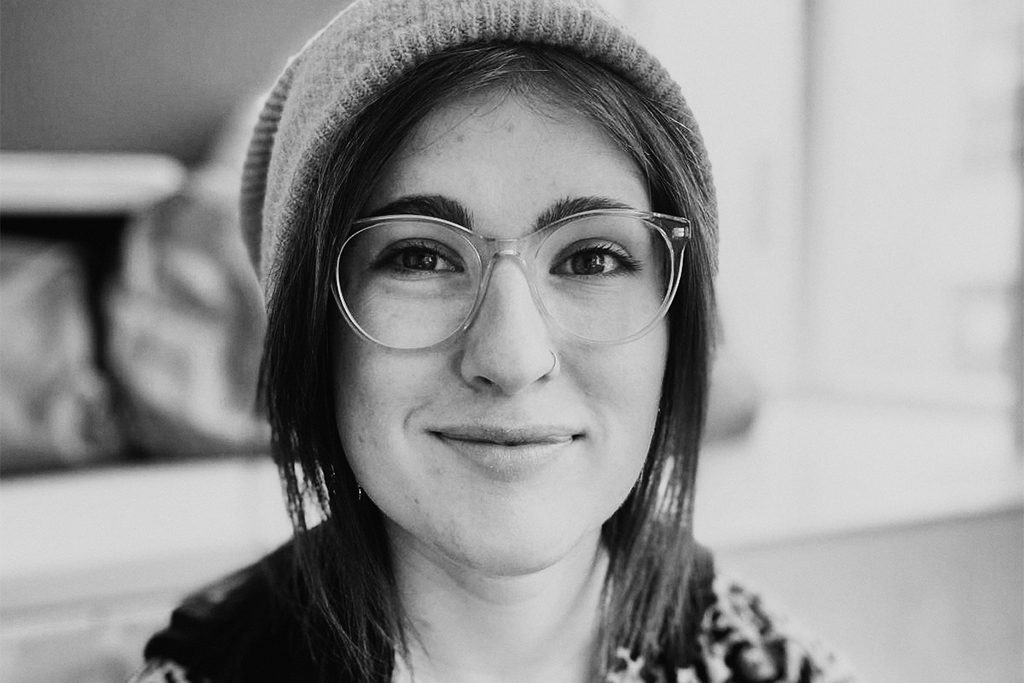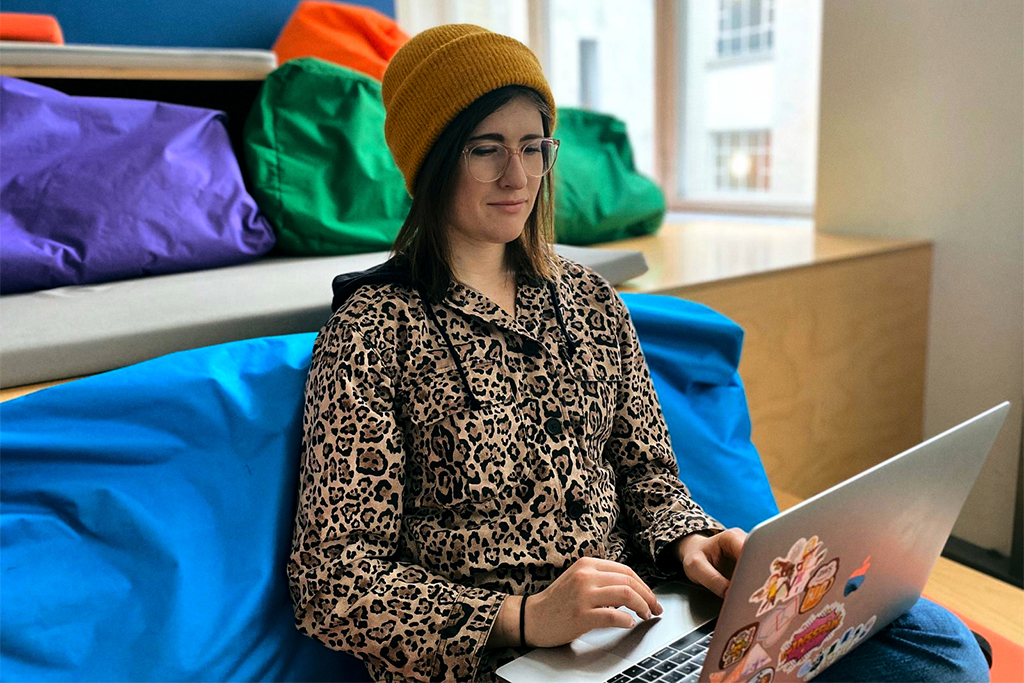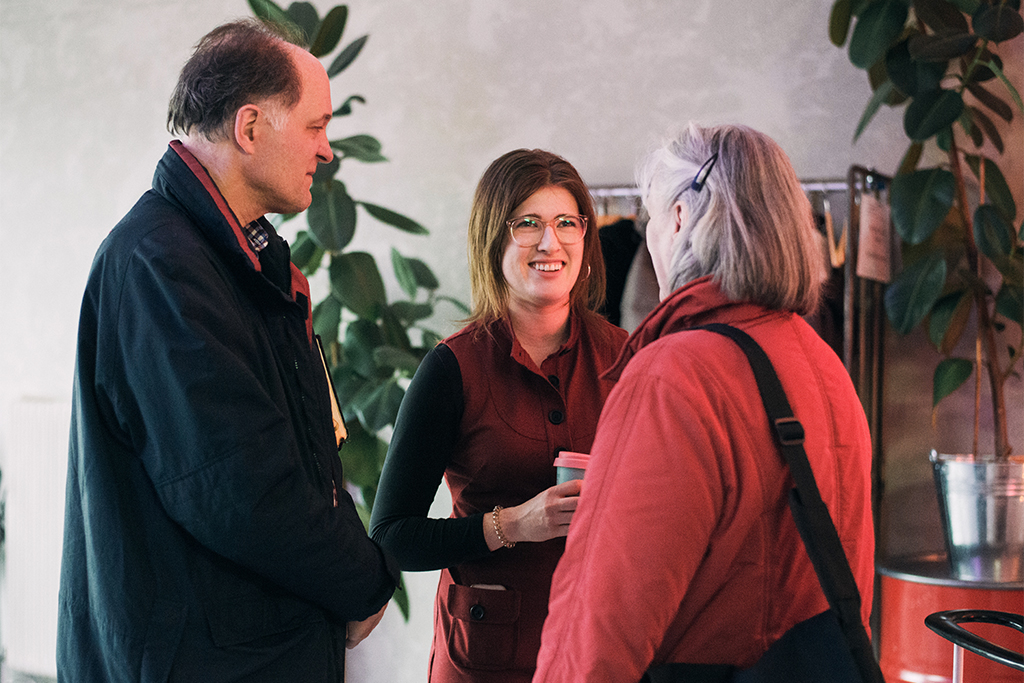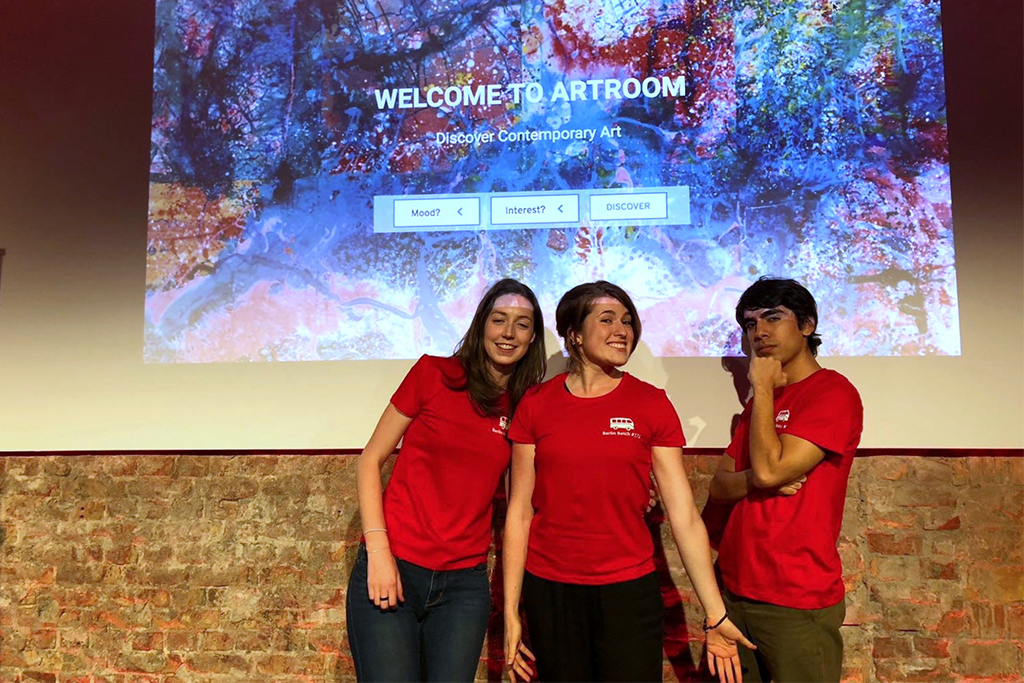A Few Small Leaps
After spending the three years after college overcome by anxiety for the future, Taylor Lindsay took a few small leaps of faith and saw God meet her abundantly.

Every day, Taylor Lindsay (MCA ’14) arrives at her desk, wearing a hoodie and carrying a coffee. Her small desk is home to a pair of drumsticks, several empty coffee cups, a row of sticky notes with Russian words she’s learning, an origami crane, and two monitors. The team of coders working in the desks close by include one Portuguese, one German, one Spaniard, one Russian, one Ukrainian, one Turk, and one Israeli. They compose one of the mobile development teams at Babbel, a language-learning company based in Berlin, Germany. Lindsay puts in her earbuds and turns on some techno, a favorite genre among her colleagues. The pulse of the music follows the rhythm of her work, which demands intensity and focus.
Five years ago, Lindsay never thought she would be working as a coder in Germany. She spent college in a flurry, desperately working in fear of not having a secure future post-grad. According to her, “bliss was being able to control consequences.” But when she finally found the security she had been looking for in an executive assistant position, she realized, watching the engineers in her workplace, she had a hidden interest in coding. While relinquishing control petrified her, she couldn’t shake the desire to change career paths. In order to achieve that dream, though, Lindsay would have to take some risks.
Back home in Colorado, Lindsay grew up with four siblings, attentive parents, and “a bunch of chickens,” an upbringing that instilled in her an appreciation for hard work. But it had a downside. “It sometimes came with a gnawing fear of what would happen if I didn’t [work hard].” While at King’s, Lindsay maintained a sleepless routine under the delusion that it would assure her security post grad. In her senior year, she took 18 credit hours, worked part-time as a faculty assistant for Dr. Dru Johnson, wrote an article a week for Christianity Today, and worked 40 hours a week at a cafe in Union Square. She suffered from regular sleep deprivation, but undeterred, Lindsay met with several professors to “plan out the rest of my life.” When she related to Dr. Henry Bleattler her fears of being ill-prepared for post-grad, he chuckled and assured her she would be fine, but these assurances did not assuage Lindsay’s anxieties.
In the three years following graduation, Lindsay plunged into a series of “fun gigs,” which made her want security more than ever. She earned internships at IndieWire, W.W. Norton, a medical paper, and “a small hipster music blog.” She worked in data entry at the Institute of International Education and held a side job as a writer for VICE media. This all made Lindsay despair: “My vision of a great, secure life, earned by hard work, was dissolving into some sort of hodge podge of purposelessness.”
At one point, she shared a box of Dunkin’ Donuts with Johnson and his wife Stephanie near their home in Harrison, N.J. Johnson listened to her. “Your model for life right now looks like stumbling forward,” he advised. “Don’t orient your life around consequences—instead, order your life around what it is you seek. You may feel like you’re moving blindly, stumbling, crawling, but you still move.”
That advice would help her become more comfortable taking life one step at a time rather than needing to have the whole plan in front of her at once. In 2016, she landed a full-time position as an administrative assistant at Babbel, a language-learning app company. At the end of that year, her boss Thomas Holl decided to return to the company headquarters in Berlin. Holl asked if Lindsay would want to join him at the mothership and she enthusiastically accepted the offer. She landed in Berlin during the early 2017. It was the dead of winter and, with no heating in her apartment, Lindsay would come home from work only to cocoon herself in blankets.
While Lindsay made friends at work, she had to hunt for a Christian community. After six months, she still had not found a solid church. Most of the people in the churches she visited were either non-committal members or tourists, making it difficult to form friendships. Finally, a friend directed her to Mosaik Berlin. The low profile of the church seemed to protect it from the irregular attendees, and it was there that Lindsay started to form a real community.
As part of her role, Lindsay was assigned some administrative work with the company’s coding team. One day, while watching the coders work, she felt a surprising desire to join them. Something about their precision and focus resonated with her. She didn’t consider herself “good at tech,” but she was also the kind of person who, if her hair straightener malfunctioned before work, could not restrain herself from popping off the casing, fiddling with the cord, scouring the internet’s suggestions, and bursting with pleasure when she resolved the issue. Even though she had a comfortable job as an executive assistant, watching the coders at work gave Lindsay the inklings of a new ambition.
After settling into her new routine in Germany, Lindsay began imagining what could be next. Watching the other developers had nudged her interest in mobile coding, but as a real career possibility, this seemed out of reach. The typical entry into coding was to take a 6,000 euro bootcamp course held eleven hours a day, six days a week, for several months. But with a 9-5 work schedule and only 2,000 euros in savings, that kind of risk was out of the question. Her friend Nicki offered to let her stay with her for free so she could save money and rent out her flat, but Airbnb rentals were not yet legal in Germany. “Nothing felt like a real possibility except moving back,” Lindsay says. So she went home to Colorado on unpaid leave, and spent the month of May considering what to do next.
While the logistics of becoming a coder complicated things, Lindsay remained thrilled with the possibility. “The decision to try to make the switch was just plain exciting,” she said. “I love scheming and dreaming, but whenever I thought about it I got a little buzz to think that ‘this could actually work, if all the doors lined up and opened all at once.’” But, the doors were not open and looking at the obstacles, Lindsay also felt scared. She did not know if she would be able to secure a job after graduating from boot camp. If she could not find a job within a month, her visa would expire and she would have to leave Germany. “This always freaked me out a little,” she recalls.
One afternoon during her Colorado hiatus, while lounging in sweatpants on her sister’s bed, Lindsay’s phone rang. It was her boss, Holl, calling to check in and see how her plans were evolving. Lindsay admitted she wanted to pursue coding, preferably in mobile development. They ran through scenarios and ideas, trying to figure out a way to make it work, but with no guaranteed job on the other end and without the money in savings to pay for the bootcamp, nothing seemed to work. They hung up, promising to keep thinking.
“Well bud,” Lindsay said to her brother Garrett who had entered the kitchen and was downing a glass of milk, “If God wants me to do all this I still need 4,000 euros for the bootcamp.” Ten minutes later, Lindsay received a text from her boss: “I just spoke to my wife and we want to help,” Holl wrote. “We’d be happy to give you a loan for the boot camp—up to 4,000 euros.” Lindsay beamed, reading the text to Garrett, who shrugged. “Wulp, there you go,” he said. The next day, Airbnb became legal in Berlin. The doors were lining up.
Bootcamp was its own beast. After attending a full day of class, Lindsay would rush home to clean her apartment, change sheets, greet a new guest and take a train back to Nicki’s apartment where she would collapse in sweat and exhaustion. Lindsay completed her bootcamp by the end of summer 2018. She applied to several companies, but working at Babbel was her first choice. She was told there were eight new trainees hired already to fill the eight new Junior positions. The next day, she received an email from Babbel with good news that there were nine teams. “You’re the last to join, so you’d have to be okay with the team. Are you interested in mobile development?” After a scream of joy, Lindsay accepted the offer.
Ever since, Lindsay has been working in mobile development at Babbel and has never regretted taking the risk. Outside of coding, she spends time building friendships with her teammates. While her colleagues all find it bizarre that Lindsay is a practicing Christian, they find it more bizarre that she doesn’t live up to their expectation of a “religious radical.” For one, she listens to what they have to say and wants to learn from them, trying to understand how their upbringings and perspectives are both similar and different from her own.
While Lindsay still feels the impulse to be busy, things have changed since college. A few weeks ago, she found herself afflicted with a nasty case of double pink-eye. Other than slathering her eyes with antibiotic cream, Lindsay could only lie in her bed, to heal. She laughs about all this over a video call with me. She’s just come in for a run and is making dinner, her phone propped up against a spare bunch of broccoli on her kitchen counter. “I’m working on becoming the person who isn’t always working on something,” she says. “But just more on being the kind of gal who can hear God’s voice.”







